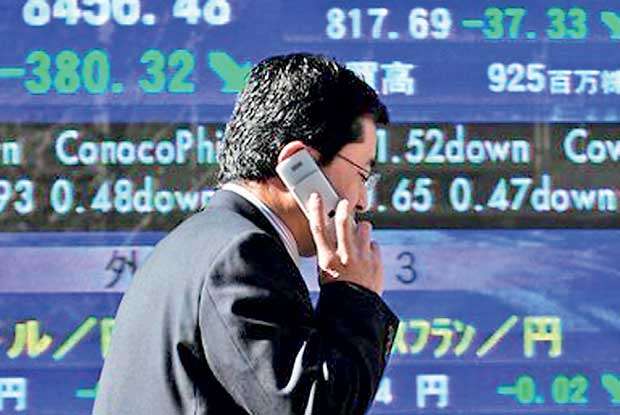10 Nov 2018 - {{hitsCtrl.values.hits}}

HONG KONG (AFP) - Asian markets turned lower yesterday as investors took their foot off the pedal at the end of a broadly positive week, while the dollar strengthened after the Federal Reserve flagged more interest rate hikes down the line.
Energy firms were among the biggest losers as oil prices fell into a bear market after dropping 20 percent from their recent highs.
The US midterms provided a much-needed filip to equities as traders bet that the expected gridlock on Capitol Hill would keep Donald Trump from pushing through measures that would likely stoke inflation and in turn rate hikes. Rising US borrowing costs have been one of the major issues weighing on global equities this year.
However, after its latest policy meeting Thursday the Fed repeated that it expected “further gradual increases” in the key interest rate as the economy goes from strength to strength.
The central bank said growth “has been rising at a strong rate”, jobs were picking up, unemployment dropping and household spending
“growing strongly”.
While it did not lift rates, observers said another move upwards next month was all but nailed on.
US markets closed mostly lower, with Asian equities following suit.
Tokyo was 0.7 percent off by lunch, Hong Kong shed 1.8 percent and Shanghai fell 0.9 percent. Sydney eased 0.4 percent, Singapore sank 0.9 percent and Seoul was off 0.2 percent. Taipei, Manila and Jakarta were also well down.
The dollar, which turned lower after the election results, picked up against most other currencies in New York and continued that trend in Asia, with emerging market and other higher-yielding units sharply lower.
“There is a sense that for now US-related incentives have all come out. But of course, the US-China summit talks at the end of the month requires attention,” Mizuho Securities said in a note.
“We expect the market’s attention for this month will go to Europe,” with the region’s overall growth, Italian fiscal conditions, and the Brexit negotiations in focus, Mizuho said.
The Mexican peso plunged more than one percent after president-elect Andres Manuel Lopez Obrador introduced plans to slash the fees banks can charge clients. The leftist has worried the business sector with rhetoric about overhauling Mexico’s economic model when he takes office on December 1.
The pound is attracting attention as a deadline approaches for Britain and the EU to reach a post-Brexit deal, with speculation the two sides are close to an agreement.
Energy firms were deep in negative territory after another sharp sell-off in oil Thursday, which came on the back of data showing a surge in US stockpiles. Crude has taken a battering since hitting four-year highs last month as rising production, the brewing China-US trade war and easing concerns about the impact of sanctions on Iran. Both main oil contracts were down yesterday.
“When you factor in that Saudi Arabia and Russia have been ratcheting up production since June, there’s a good reason the bears are holding court and the primary reason why prices are plummeting,” said Stephen Innes, head of Asia-Pacific trade at OANDA.
Among the worst-hit energy firms were CNOOC, which lost almost four percent in Hong Kong, while Tokyo-listed Inpex sank 2.5 percent and Australia’s Woodside Petroleum dropped 1.5 percent.
16 Nov 2024 4 hours ago
16 Nov 2024 5 hours ago
16 Nov 2024 5 hours ago
16 Nov 2024 6 hours ago
16 Nov 2024 7 hours ago